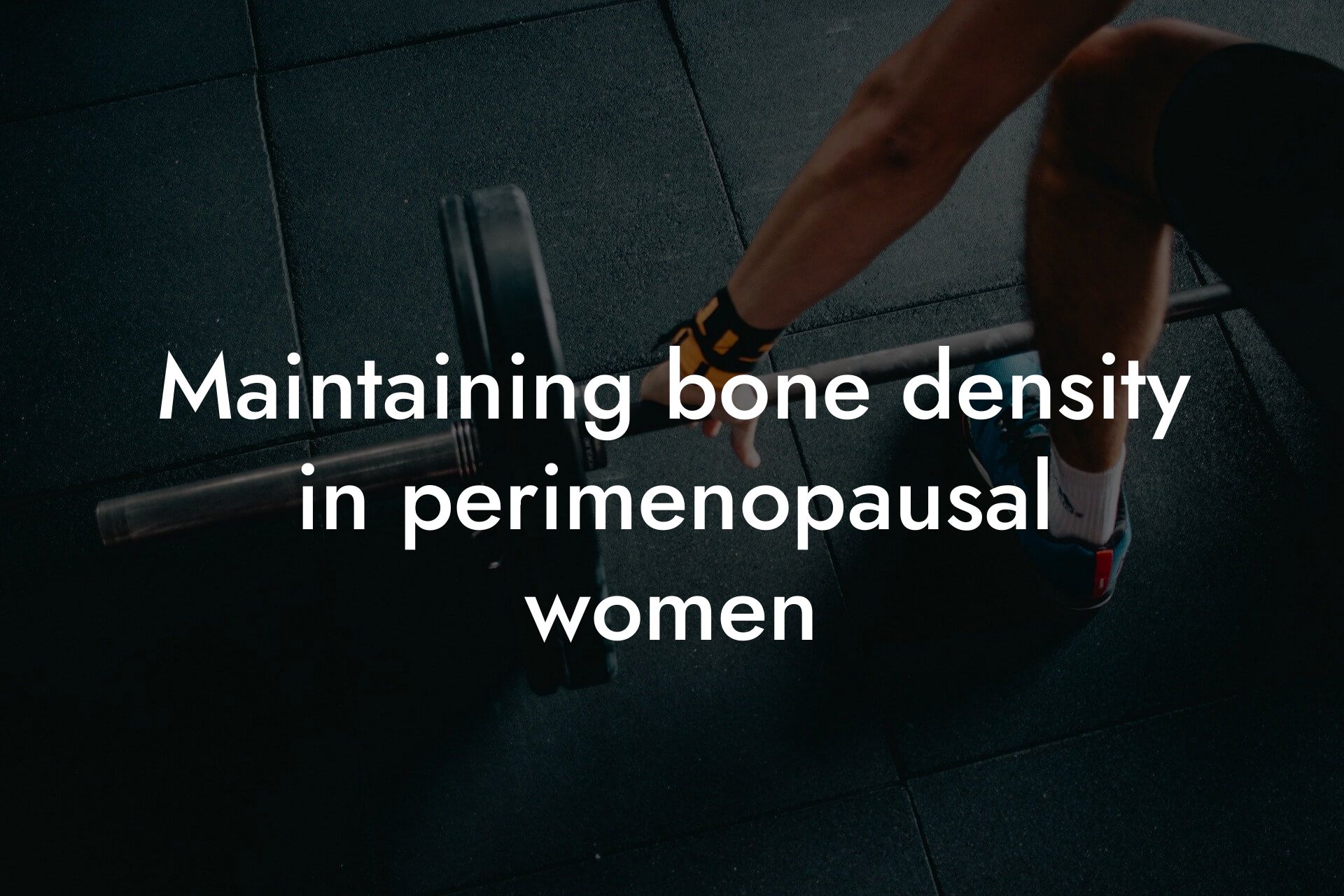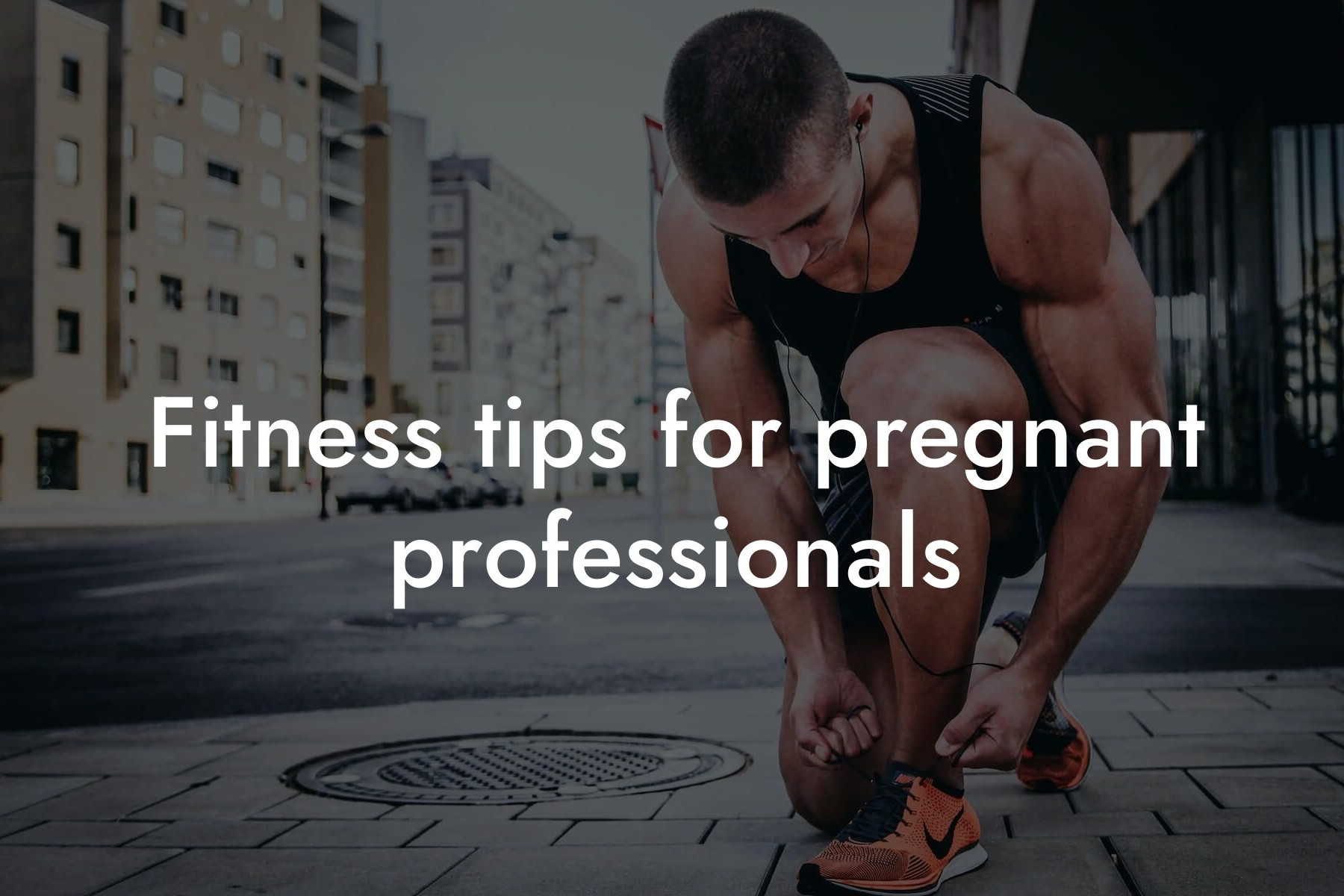As a high-earning professional, you understand the importance of presenting yourself with confidence and authority. Your physical appearance can play a significant role in how others perceive you, and it can also impact your overall well-being and energy levels. As a woman in leadership, it's essential to prioritize your body composition to achieve your goals and maintain a healthy work-life balance. In this article, we'll explore the importance of body composition for women in leadership and provide you with effective strategies to achieve your goals.
Table of Contents
The Importance of Body Composition for Women in Leadership
Body composition refers to the percentage of fat and lean mass in your body. Having a healthy body composition is crucial for women in leadership as it can impact their energy levels, confidence, and overall health. A healthy body composition can help you:
- Improve your physical appearance, boosting your confidence and self-esteem
- Increase your energy levels, allowing you to tackle challenging tasks and responsibilities
- Enhance your mental clarity and focus, making you more effective in your role
- Reduce your risk of chronic diseases, such as diabetes and heart disease
- Improve your sleep quality, leading to better rest and recovery
Understanding Your Body Composition
To develop an effective body composition strategy, it's essential to understand your current body composition. At Tano Performance Group, we use a DEXA machine to provide a comprehensive body assessment. This non-invasive test measures your:
- Body fat percentage
- Lean mass (muscle and bone density)
- Bone density
- Visceral fat (fat around your organs)
This information provides a detailed picture of your body composition, allowing you to identify areas for improvement and track your progress over time.
Setting Realistic Goals
Before starting any body composition strategy, it's essential to set realistic goals. Consider what you want to achieve and why it's important to you. Ask yourself:
- What are my specific goals (e.g., reduce body fat, increase lean mass)?
- Why are these goals important to me (e.g., improve confidence, increase energy levels)?
- What changes am I willing to make to achieve my goals (e.g., dietary changes, exercise routine)?
Having clear goals will help you stay motivated and focused on your body composition journey.
Nutrition Strategies for Women in Leadership
Nutrition plays a critical role in body composition. As a woman in leadership, it's essential to fuel your body with nutrient-dense foods that support your goals. Consider the following nutrition strategies:
- Eat protein-rich foods to support lean mass growth and maintenance
- Incorporate healthy fats to support hormone production and satiety
- Focus on whole, unprocessed foods to reduce inflammation and improve nutrient intake
- Stay hydrated by drinking plenty of water throughout the day
Additionally, consider working with a registered dietitian or nutritionist to develop a personalized meal plan that meets your specific needs and goals.
Exercise Strategies for Women in Leadership
Regular exercise is essential for improving body composition. As a woman in leadership, it's essential to incorporate exercises that support your goals and fit your busy schedule. Consider the following exercise strategies:
- Incorporate strength training exercises to build lean mass and increase bone density
- Perform high-intensity interval training (HIIT) to improve cardiovascular health and burn fat
- Include low-impact exercises, such as yoga or Pilates, to improve flexibility and reduce stress
- Aim for at least 150 minutes of moderate-intensity exercise per week
Remember to listen to your body and adjust your exercise routine as needed. It's also essential to incorporate rest and recovery days to allow your body to repair and adapt.
Stress Management and Sleep
Chronic stress and poor sleep can significantly impact your body composition. As a woman in leadership, it's essential to prioritize stress management and sleep to support your goals. Consider the following strategies:
- Practice stress-reducing techniques, such as meditation or deep breathing
- Establish a consistent sleep schedule and create a relaxing bedtime routine
- Avoid screens and electronic devices at least an hour before bedtime
- Get at least 7-8 hours of sleep per night
By prioritizing stress management and sleep, you can improve your overall health and well-being, leading to a more balanced body composition.
Tracking Progress and Staying Motivated
Tracking your progress and staying motivated are crucial to achieving your body composition goals. Consider the following strategies:
- Take progress photos and measurements regularly
- Track your workouts and nutrition using a journal or mobile app
- Celebrate small victories and milestones along the way
- Find a workout buddy or accountability partner to stay motivated
By tracking your progress and staying motivated, you can stay focused on your goals and make adjustments as needed.
Achieving a healthy body composition is essential for women in leadership. By understanding your body composition, setting realistic goals, and incorporating effective nutrition and exercise strategies, you can improve your physical appearance, increase your energy levels, and enhance your overall health and well-being. Remember to prioritize stress management and sleep, track your progress, and stay motivated to achieve your goals. At Tano Performance Group, we're committed to helping you achieve your body composition goals and take your business to the next level.
Frequently Asked Questions
What is body composition, and why is it important for women in leadership?
Body composition refers to the percentage of fat and lean mass in your body. As a woman in leadership, having a healthy body composition is crucial because it directly affects your energy levels, confidence, and overall well-being. When you have a healthy body composition, you're more likely to feel empowered, focused, and capable of tackling the demands of your role.
How does body composition impact my energy levels?
When you have a high percentage of body fat, it can lead to energy crashes, brain fog, and fatigue. This is because excess fat can slow down your metabolism, making it harder for your body to convert food into energy. On the other hand, having a high percentage of lean mass can boost your energy levels, as it helps your body to burn fat more efficiently.
What are the common body composition challenges faced by women in leadership?
Women in leadership often face unique body composition challenges, such as hormonal imbalances, stress, and lack of time for self-care. These challenges can lead to weight gain, water retention, and a decrease in lean mass. Additionally, societal pressure to conform to unrealistic beauty standards can also affect their body image and self-confidence.
How can I measure my body composition?
There are several ways to measure body composition, including dual-energy X-ray absorptiometry (DXA), skinfold measurements, and bioelectrical impedance analysis (BIA). At Tano Performance Group, we recommend using DXA scans, as they provide a comprehensive and accurate assessment of your body composition.
What is the ideal body fat percentage for women in leadership?
The ideal body fat percentage varies depending on age, fitness level, and health goals. However, for women in leadership, a healthy body fat percentage range is typically between 21-33%. This range allows for optimal energy levels, hormone function, and overall health.
How can I reduce my body fat percentage?
To reduce your body fat percentage, focus on creating a calorie deficit through a combination of healthy eating and regular exercise. Aim to eat nutrient-dense foods, including lean proteins, whole grains, and plenty of fruits and vegetables. Additionally, incorporate strength training exercises to build lean mass and boost your metabolism.
What is the importance of lean mass for women in leadership?
Lean mass, which includes muscle and bone density, is essential for women in leadership because it helps to boost metabolism, increase energy levels, and improve overall health. Having a high percentage of lean mass can also enhance confidence and self-esteem, allowing you to take on challenges with more authority and conviction.
How can I build lean mass?
To build lean mass, focus on resistance training exercises, such as weightlifting, bodyweight exercises, or resistance band exercises. Aim to do these exercises at least three times a week, targeting all major muscle groups. Additionally, make sure to consume enough protein to support muscle growth and repair.
What is the role of hormones in body composition?
Hormones play a crucial role in body composition, as they regulate metabolism, appetite, and fat storage. For women in leadership, hormonal imbalances, such as polycystic ovary syndrome (PCOS) or thyroid disorders, can affect body composition and overall health. Working with a healthcare professional to balance your hormones can help to optimize your body composition.
How can I manage stress to support my body composition goals?
Chronic stress can disrupt hormones, leading to weight gain and fat storage. To manage stress, prioritize self-care activities, such as meditation, yoga, or deep breathing exercises. Additionally, make sure to get enough sleep, aim for 7-9 hours per night, to help regulate your hormones and support your body composition goals.
What is the impact of sleep on body composition?
Sleep plays a critical role in body composition, as it helps to regulate hormones, metabolism, and appetite. When you don't get enough sleep, you're more likely to experience cravings for unhealthy foods, leading to weight gain and fat storage. Aim for 7-9 hours of sleep per night to support your body composition goals.
How can I incorporate self-care into my busy schedule?
Incorporating self-care into your busy schedule is crucial for supporting your body composition goals. Start by prioritizing activities that bring you joy and relaxation, such as reading, taking a walk, or practicing yoga. Even small moments of self-care, such as taking a few deep breaths or stretching during a meeting, can make a significant difference.
What are some healthy snacks that support body composition goals?
Healthy snacking is essential for supporting your body composition goals. Focus on snacks that are high in protein and fiber, such as nuts, seeds, fruits, and vegetables. Avoid sugary or processed snacks that can lead to energy crashes and weight gain.
How can I stay motivated to reach my body composition goals?
Staying motivated to reach your body composition goals requires a combination of accountability, support, and celebration of small victories. Work with a healthcare professional or fitness coach to create a personalized plan, and share your goals with a friend or family member to increase accountability. Celebrate small victories along the way, such as increasing your water intake or completing a challenging workout.
What are some common myths about body composition?
There are several common myths about body composition, including the idea that you need to be skinny to be healthy or that weight loss is solely about willpower. At Tano Performance Group, we believe that body composition is about achieving optimal health and wellness, rather than conforming to unrealistic beauty standards.
How can I maintain my body composition goals during travel or holidays?
Maintaining your body composition goals during travel or holidays requires planning and preparation. Pack healthy snacks, stay hydrated, and prioritize self-care activities, such as stretching or meditation. Additionally, research local gyms or fitness studios to stay active and on track with your fitness goals.
What are some common body composition mistakes that women in leadership make?
Common body composition mistakes that women in leadership make include neglecting self-care, overexercising, and underfueling. These mistakes can lead to burnout, fatigue, and decreased productivity. At Tano Performance Group, we recommend prioritizing self-care, listening to your body, and fueling your body with nutrient-dense foods.
How can I balance my body composition goals with my busy schedule?
Balancing your body composition goals with your busy schedule requires prioritization and time management. Schedule self-care activities, workouts, and meal prep into your calendar, and make sure to leave some buffer time for unexpected events. Additionally, focus on making sustainable lifestyle changes, rather than trying to make drastic changes that may not be maintainable.
What are some body composition-friendly exercises for women in leadership?
Body composition-friendly exercises for women in leadership include strength training exercises, such as squats, lunges, and deadlifts, as well as high-intensity interval training (HIIT) workouts. These exercises can help to build lean mass, boost metabolism, and increase energy levels.
How can I track my progress and stay accountable?
Tracking your progress and staying accountable is crucial for achieving your body composition goals. Use a food diary or mobile app to track your nutrition, and take progress photos or measurements to monitor your progress. Additionally, work with a healthcare professional or fitness coach to create a personalized plan and receive regular check-ins and support.
What are some common misconceptions about body composition and women in leadership?
Common misconceptions about body composition and women in leadership include the idea that women need to be thin to be successful or that body composition is solely about aesthetics. At Tano Performance Group, we believe that body composition is about achieving optimal health and wellness, which can lead to increased confidence, productivity, and success in leadership roles.
How can I prioritize my body composition goals without feeling guilty or selfish?
Prioritizing your body composition goals without feeling guilty or selfish requires a mindset shift. Instead of viewing self-care as selfish, recognize that taking care of your physical and mental health is essential for being a more effective and confident leader. Remember, you can't pour from an empty cup, so prioritize your own health and wellness to show up more fully for others.
Here are some related articles you might love...
- Body composition considerations for vegetarian athletes
- Maintaining bone density in perimenopausal women
- Fitness tips for pregnant professionals
- Tailored fitness programs for executives
- The unique challenges of maintaining fitness in high-stress jobs
- How cultural differences impact body composition goals
- How to manage body composition after childbirth
- Fitness and nutrition strategies for shift workers
- Fitness programs for older professionals
Zak Faulkner
Zak Faulkner is a leading authority in the realm of physical health and body composition analysis, with over 15 years of experience helping professionals optimise their fitness and well-being. As one the experts behind Tano Performance Group, Zak has dedicated his career to providing in-depth, science-backed insights that empower clients to elevate their physical performance and overall health.
With extensive knowledge of DEXA technology, Zak specializes in delivering comprehensive body assessments that offer precise data on body fat, muscle mass, bone density, and overall physique. His expertise enables individuals to make informed decisions and achieve their fitness goals with accuracy and confidence. Zak’s approach is rooted in a deep understanding of human physiology, combined with a passion for helping clients unlock their full potential through personalised strategies.
Over the years, Zak has earned a reputation for his commitment to excellence, precision, and client-focused service. His guidance is trusted by top professionals who demand the best when it comes to their health. Whether advising on fitness programs, nutritional strategies, or long-term wellness plans, Zak Faulkner’s insights are a valuable resource for anyone serious about taking their health and fitness to the next level.
At Tano Performance Group, Zak continues to lead our Content Team revolutionising how professionals approach their physical health, offering unparalleled expertise that drives real results.




